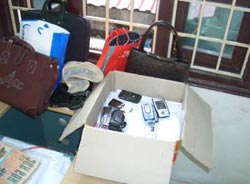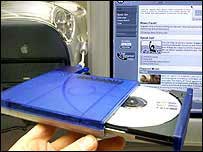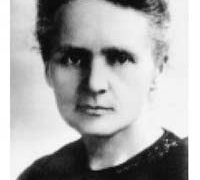A rare case of exam cheating during this year’s university and college entrance exam season: A candidate from the Banking Academy used a mobile phone to copy answers from outside. The cleverly hidden earpiece was only discovered when this “student” removed… their wig. The method of cheating through high-tech means, involving networks of participants, has begun to raise more alarms…
The “dark” hand of high-tech
The phenomenon of exam cheating by exploiting the sophisticated functions of high-tech devices during exams has been warned about for some time, but it seems the education sector has remained somewhat passive until this year. When cheating via mobile phones surged during the first round of this year’s university and college entrance exams, the Department of Higher Education finally signed an urgent document to all admission councils prohibiting the use of these devices.
 |
|
This year, mobile phones were confiscated in exam rooms to combat cheating. Photo: Kiều Oanh |
Accordingly, candidates are not allowed to bring mobile phones or other communication devices into the exam room. Even the exam supervisors will be held jointly responsible if they allow candidates to engage in such actions. The urgent document also specified that exam supervisors are not permitted to carry mobile phones while on duty.
Returning to the aforementioned “wig incident,” candidate Vũ Việt Đức, born in 1987 (from Lạng Sơn), initially confessed to spending 20 million VND to hire someone to prepare answers, which were then read to him via mobile phone during the exam. When caught red-handed, Đức’s Nokia phone was found to be operational in listening mode for over 100 minutes. From this “mobile reminder,” the PA25 unit used professional methods to clarify the phone numbers that had called Đức. He revealed that the network assisting him had placed someone in the exam to leak questions outside, which were then solved and communicated back to him via mobile phone.
Another case of cheating was also discovered at the Banking Academy’s exam site. Another candidate was caught by the PA25 police using a mobile phone with an earpiece in the exam room. This action went unnoticed for 45 minutes, despite the exam supervisor being present!
During the first entrance exam with three subjects in block A: Mathematics, Physics, and Chemistry, after completion, the Ministry of Education and Training’s Inspectorate announced nearly a dozen cases of cheating using mobile phones. Since this is still a relatively new and sophisticated form of cheating, this number may just be “the tip of the iceberg.” Warnings along with strict disciplinary measures against candidates engaging in such violations—based on past experiences—will be significant for the upcoming exams in blocks B and C, which are considered more favorable for transmitting solutions and materials through advanced, compact devices.
The “mobile” phone, which once facilitated communication for candidates and their families during university entrance exams, has now become an “accomplice” in these new cheating schemes, raising serious concerns this exam season. Naturally, this is not the first time such cheating has been warned against. In the 2005 exam season, a network was dismantled in Bắc Giang for hiring individuals to provide answers via mobile phones.
A “mobile,” an MP3 player, a recording device… the size of a computer and just as small as a “cat’s gut float,” and photocopied materials so small they can’t get any smaller… have slipped through the cracks even with regulations stating that candidates are only allowed to bring pens, rulers, and exam notice papers into the exam room.
How to combat cheating?
 |
|
A CD-ROM can hold hundreds of papers “copied” from the Internet. (Photo: VNN) |
The methods of cheating in exams, like other forms of cheating, are becoming increasingly sophisticated with the aid of high-tech devices and the extremely rapid and easy ability to copy in cyberspace.
As online information sources become limitless, copying someone else’s intellectual property has become a frequently encountered issue. In terms of education and examinations, both globally and in Vietnam, many plagiarism and cheating cases have been exposed. Sometimes, just a few minutes of browsing online can yield hundreds of pages of project work or thesis. After conducting a few search operations, the remaining task is simply copy and paste.
In South Korea, there has been a case of students submitting theses that were downloaded from the Internet. Copying materials online to use as their own during exams has become so common that some schools have required students to write essays with ink pens instead of typing, to prevent their essays from being copied online.
To combat this more thoroughly, many universities have developed a program to detect essays that are “suspiciously… fishy” (copied). This program is called the “Korea University Essay Control System” (KUREPOLS).
Regarding this program, the Korea Times reported: Based on a compilation of students’ essays in the form of documentation, the KUREPOLS program examines every sentence in the essay and compares it with essays from other students to determine if the essay is plagiarized. The system then randomly selects a passage and compares it with other sources found on search engines like Google. The search results are forwarded to professors in order of the “most suspicious” essays, based on which professors will review the essays to reach a final conclusion.
In our country, exam cheating has long been a headache, especially as machinery and high-tech devices continue to diversify and evolve. Within the vast, endless cyberspace, it is not easy for those supervising examinations to pinpoint “thieves.”
Two years ago during the exam season, the author of this article heard about a candidate who, after leaving the exam room, was satisfied with having outsmarted the exam supervisor. This individual successfully made a phone call outside to “request assistance” while claiming to have called from the restroom.
Thus, being vigilant against sophisticated forms of cheating that may occur and strictly enforcing fairness in examinations will help limit these cheating methods. However, it seems that the regulations prohibiting mobile phones in exam rooms, recently issued by the Department of Higher Education, still have loopholes, as many other digital devices such as MP3 players, recording pens, multifunctional computers, and digital cameras with mathematical formulas… have not been addressed.
Perhaps one of the most prominent issues during this year’s university entrance exam season is the phenomenon that can be considered a “burst” of cheating via mobile phones. When mentioning this, Quách Tuấn Ngọc, Director of the IT Center at the Ministry of Education and Training, stated: “This is a normal issue in the technological era. The most effective measure is to use technology to combat technology, meaning considering the deployment of jamming devices (within 100m) and signal detectors at exam sites.”
Regarding the issue of copying essays online during the exam season, Mr. Ngọc also mentioned that the street market for theses is even more troubling than the online thesis market. He suggested: “Let’s make all theses public online. Although cyberspace is vast, it is still easier to control and monitor than at photocopy shops.” The reason is: When “plagiarizing” online, if one thief is not caught by one person, they will be caught by another. If it is merely copy and paste, it will be exposed during the defense or when questioned…
“The internet is an endless space with countless materials for reference in studying, examinations, making projects, and theses, but remember to cite your sources and be aware of what is yours and what is referenced from elsewhere to demonstrate honesty and avoid unfortunate cases.“, Mr. Ngọc said.
B.D


















































